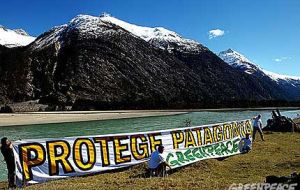MercoPress. South Atlantic News Agency
Patagonia's massive dam project protest reaches Spain
 Greenpeace activist in Chile
Greenpeace activist in Chile Greenpeace activists on Monday morning brought their concerns over a controversial Spain's Endesa HidroAysen dam project in Chilean Patagonia directly to the company's doorstep, scaling its headquarters building in Madrid, draping an attention-grabbing, several-story-high protest banner, reports Patagonia Times.
"Good morning Endesa" the bright-yellow sign read. "If you're really concerned about your children's children, don't destroy Patagonia." The message, written in the form of a letter and signed "Sincerely, Greenpeace," echoes an Endesa ad campaign in Chile which the company expresses its concern for "the future of your children's children." Greenpeace is one of several leading environmental groups opposing plans by Endesa and its Chilean partner, Colbun, to build massive hydroelectric dams in far southern Chile's Region XI, an area of Patagonia also known as Aysen. The HidroAysen Project includes five dams slated for the region's two largest rivers – the Baker and the Pascua – and promises an installed generating capacity of some 2,750 MW. Backers of the project insist it is a national priority and will provide the energy Chile needs to continue its economic development. Greenpeace and other critics, however, say the dams and accompanying transmission line will ruin the Baker and Pascua Rivers and open up Chilean Patagonia to further industrialization. Indeed, Endesa and Colbun are by no means the only companies interested in tapping Aysen's hydroelectric potential. "If allowed to go forward, this project will be just the first in a series of dams that will flood Chilean Patagonia, damaging the area irreversibly," said Rodrigo Herrera, the director of Greenpeace Chile. "We've come to Spain to ask Endesa once again not to destroy Patagonia. They've said they will present the (environmental) studies for the dams in July and that in 2009 they will submit studies for the transmission line. There's no sense continuing with this project and they should give up on the idea of damming Patagonia," he said. Given the amount of money Endesa and Colbun have reportedly invested in the Project already, it's unlikely they'll heed Herrera'a advice. According to sources cited in the Chilean daily La Tercera, the companies have spent some 40 million UD dollars on the project, dropping 6 million alone on an 11,000-page Environmental Impact Study (EIS) they plan to submit to Chile's National Environmental Commission (CONAMA) later this month. CONAMA is likely to spend as much as one year evaluating the project before deciding whether to approve the dams. Overall the project is expected to cost some 3 billion US dollars. That price tag does not include the estimated 2 billion it will cost to build a 2.300-kilometer transmission line required to carry the electricity from Aysen to central Chile. The company behind the costly power line project, Canadian-owned Transelec, plans to submit an EIS in mid 2009. Endesa's high profile antics coincided with a visit to Spain by Chilean environmentalist Juan Pablo Orrego, who spoke throughout the country about problems associated with the polemical dam venture. A leading voice in the international "Patagonia sin Represas" (Patagonia without Dams) campaign, Orrego also heads the Santiago-based environmental NGO Ecosistemas. "Thanks to the tour there are now more Spanish organizations willing to help us prevent European companies from implementing such a destructive project in Chilean Patagonia," he said. Orrego and other critics of the dam project insist it is not only objectionable but also unnecessary. Rather than approve a venture that relies on outdated technology, they argue, the Chilean government ought to encourage investment in non-conventional renewable energy projects such as wind farms and solar facilities. "Chile is a country that's exceptionally rich in terms of renewable energy sources; exceptionally rich" according to Orrego. "We could have solar energy in the north, wind energy throughout the entire country, geothermic energy from top to bottom, and tidal generators. But so far in Chile nothing's been done with all these renewable energy sources. We've also done nothing in terms of efficiency". The Santiago Times




Top Comments
Disclaimer & comment rulesCommenting for this story is now closed.
If you have a Facebook account, become a fan and comment on our Facebook Page!